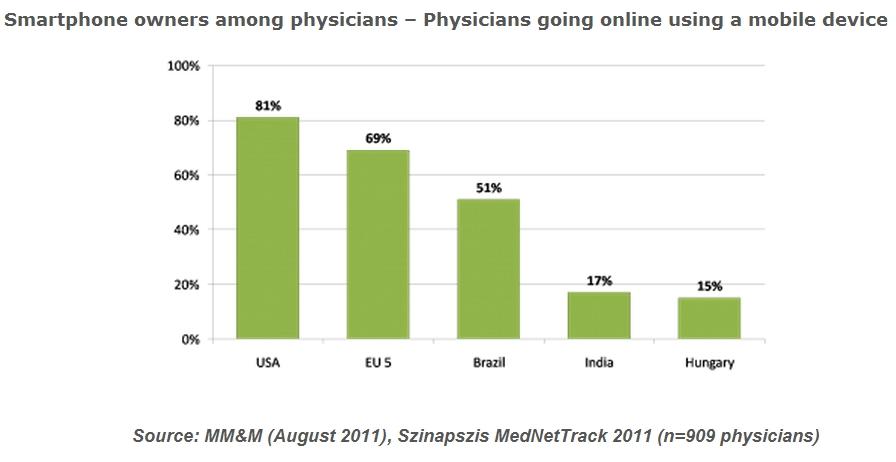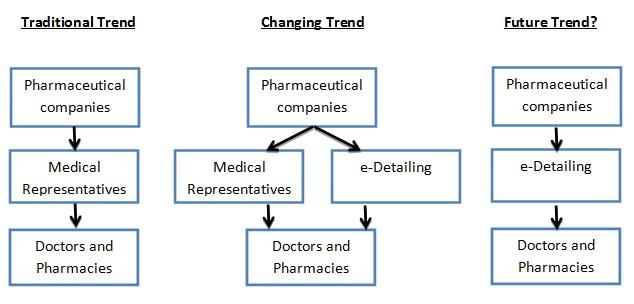Many pharmaceutical companies are still wary about embracing digital marketing tools as this industry has to adhere to high standards of information quality, with brand image especially vulnerable to any misinformation. However, the internet population around the world is getting glued to various social networking sites, micro-blogging sites, and online communities, and it has become a common scene today to see people browsing the internet for health related matters. The demand for authentic information on drugs and diseases online makes it essential for the pharmaceutical sector to keep up with the pace of this digital wave. On the one hand they can reach out faster to their existing or prospective customers; on the other hand these emerging tools serve as a medium to overcome many of the challenges they face using traditional marketing tools.
Digital technologies to support healthcare, or ‘eHealth’, have virtually redefined healthcare through the emergence of Electronic medical records, practice management systems, telemedicines, mobile health, and online medical journals. However the progress in Healthcare technology has been best made by the world’s developed nations. In 2007, the European Commission launched the Lead Market Initiative for Europe and ‘eHealth’ was chosen to be one of the six sectors of this initiative. Its aim was to deliver better and affordable healthcare within a citizen-centered health delivery system.
The success of technology in healthcare implemented by these countries often provides a model for the rest of the world to follow, encouraged by their understanding of how digital marketing has overcome common challenges faced by conventional methods of communication.
e-Detailing – A way forward for pharmaceutical sales
Doctors today are getting busier with patients, hospitals, medical representatives and sometimes even medical paper work and conferences. This makes it difficult for medical reps to spend valuable time detailing the doctors about a specific drug, indirectly affecting pharma sales. With an increasing number of doctors adopting the internet and smartphones, pharmaceutical companies are increasingly embracing e-Detailing practices.

Physicians going online using a mobile device
Some might argue that we will see the day when e-Detailing has completely replaced the Medical Representative in some areas.

Traditional, changing and future trends
In many cases, however, the most effective approach will be to integrate an e-Detailing strategy with face to face interaction between reps and healthcare professionals. Somaxon pharmaceuticals, for example, employed 215 sales reps together with an e-Detailing portal, for the launch of their Silenor drug. The authenticity of the information about sensitive drugs like Silenor provided at the time of detailing becomes the most important factor to capture the trust of doctors. It is easier to monitor such information that the pharmaceutical companies provide through e-Detailing websites like these, however this becomes impractical when it comes to sales reps.
Online patient & physician communities – a solution for rapid and cost-effective clinical trials
Recruitment of patients into clinical trials has been a challenging task for its sponsors. While the cost of conducting clinical trials has risen, poor participation of patients can lead to lengthy delays for the development of a drug. Participatory medicine has given rise to ‘e-patients’ who use the internet to seek medical and health information. This provides an opportunity for pharmaceutical companies and patient recruitment companies to use digital marketing tools such as social media, to educate and recruit e-patients into clinical trials.
Some pharmaceutical companies have already initiated patient recruitment through social media which have proven to be more cost-effective. Recently, Lilly conducted two pilots in diabetes and head and neck cancer, which is said to have reduced their recruitment costs by 10-15%. Novartis has run a short pilot on Twitter through its account @novartistrials in order to create awareness about clinical trials in the US. Another initiative, from Pfizer, included a dedicated YouTube channel, in support of clinical trials.
Social media and other online communities play an important role in connecting patients with rare medical conditions who are geographically scattered. They serve as a common platform for patients and physicians to connect with one another in understanding updated information about such medical conditions and treatments.
e-Prescriptions – a tool to fight fraudulent practices
A common challenge that the pharmaceutical industry faces today is with the forging of prescriptions. One of the biggest reasons for this illegal acquisition of pharmaceuticals is the increasing addiction to prescription narcotic drugs seen in today’s world. For example: In 2005, a Canadian woman had faced 234 charges of double-doctoring when she managed to obtain prescriptions for 6000 pills. She received false prescriptions for this narcotic drug from 28 doctors and 22 pharmacies in the region.
MedRunner is a Canadian based company whose services can offer a solution to problems related to prescription forgery. Their technology works by allowing doctors to send their prescriptions online, using laptop, desktop, tablet or mobile device, to pharmacies thus avoiding occurrences of double-doctoring or illegible handwriting.
Conclusion
The internet has given rise to patient-centric healthcare, where patients are an active participant in the healthcare delivery process. While innovators are leading the way in implementing digital tools to improve their effectiveness, many opportunities still exist for stakeholders in healthcare to achieve better results, at a lower cost and with better health outcomes.
—
Suchitra Menon is a member of Creation Healthcare’s international consultant team and is based in Bangalore, India. Creation Healthcare’s perspectives from its team on the ground worldwide enable us to plan strategies that embrace changing global trends and local insights.
To find out how Creation Healthcare can help you, contact us.

